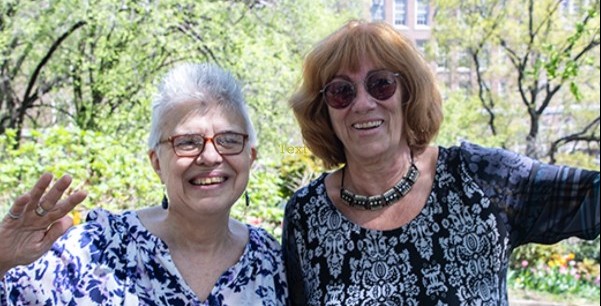Looking Forward, Looking Back: Professors Marion Riedel and Barbara Simon Retire

Two full-time faculty members are (at least formally) retiring from teaching at the end of this year.
Associate Professor of Professional Practice Marion Riedel (right) trains practitioners in “harm reduction,” a set of practical strategies and ideas aimed at reducing negative consequences associated with drug use but in a nonjudgmental way, one that respects the rights and individuality of users. She has worked for many years as a social worker with adolescents, people living with and affected by HIV/AIDS, and people with problematic use of drugs and alcohol.
You wouldn’t guess that Riedel is retiring soon, as I had to track her down in Uganda, where she is training staff for a non-governmental organization that works with women involved in transactional sex. In retirement, she plans to continue with this project as a consultant. She will also continue her work with the Lower Eastside Girls Club and the antiracist group the People’s Institute for Survival and Beyond, as well as testing the waters of politics by running for a “very, very minor” office.
It’s a similar story with Professor of Social Work Barbara Levy Simon, who is an authority on the history of social work and activism in New York City. Simon has published three books including a social work writing guide. Although she looks forward to a “shared retirement” with her partner, a professor of English literature, with time to read, travel, and garden, like Dr. Riedel she doesn’t intend to withdraw completely from social work. After taking a year off, she’ll teach one doctoral course that she’s long been planning.
Fortunately, I was able to catch up with these human dynamos—collectively, they have given the Columbia School of Social Work sixty years of service—for long enough for them to reminisce about their careers and share a few highlights.
What do you remember most clearly about the first class you taught?
Riedel: I was teaching Advanced Clinical Practice with Families and Children while doing my dissertation on a multi-family group of women living with AIDS and their adolescent children. I told my students that the families were often in crisis, and their kids would go and live under the subway tracks at 42nd Street, and we would have to do outreach to find them. One day a student said, “Professor, we came here to learn about advanced clinical practice, and you’re just telling us stories.” I responded that there was no better place for advanced clinical practice than under The Deuce (as Times Square was then called). The students eventually got it.
Simon: I started teaching full time in 1979, when I was 29. So I changed from contact lenses to glasses in order to look more professorial. And I went to outlets in Philadelphia to get suits so that I could look a little more formal. My first thought when I was teaching was, “I hope I know enough to offer something, and I hope I look old enough to do the job.”
What role has been most important to you in your working life?
Riedel: I did not go to college right after high school. Instead, I ended up working with my first husband in one of the first group homes created after the deinstitutionalization acts passed. I was a house parent for eight adolescent boys who were developmentally delayed, autistic, or, frankly, just abandoned. I had no training. And I raised those boys for four and a half years. If there’s a moment I look back to and say “Wow!,” that was it.
Simon: Being a colleague. When I got here in ‘86, I’d already been teaching for seven years full time. But I learned a lot from some wonderful senior colleagues who were dedicated committee workers. Most of them were publishing up a storm and were well-known people, but they would take their committee work seriously, and really come prepared to meetings and take the issues seriously. And it was a wonderful education for me.
What would you like to be your legacy at the School?
Riedel: For the last two years I’ve been the co-convener of the PROP [Power, Race, Oppression, and Privilege] initiative with Adjunct Lecturer Ovita Williams, an administrator in the field education department. She and other allies of color have encouraged me to use my advantages to further the goals of PROP. Because I’m a white woman, I’m older, and my position as a professor is secure, my privilege has given me the freedom to push for agendas that weren’t popular. I hope that part of my legacy is that we’ve moved that agenda forward more than we might have.
Simon: Because I work in social work/social welfare history, I hope that the history of whatever it is people are teaching about is taught. Of course most of the focus has to be on the present, and on being in the present for clients and communities. But I think it’s important to know from whence we’ve come. I hope my legacy will be the infusion and suffusion of historical context into a variety of courses.
* * *
Looking forward, but also looking back: Simon has perfectly captured the spirit of this all too-brief tribute. We at the School of Social Work wish these two beloved professors all the best and hope they will come back to visit us often. If you would like to leave a tribute for one or both of them, we invite you to share in the comments.